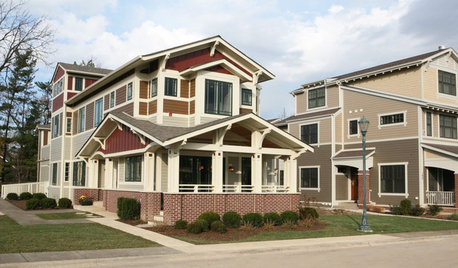Selling house with unpermitted work.
Hi,
We did some kitchen and bathroom remodel 9 years ago. We didn't know a permit would be required for it. The contractor didn't say a permit from city would be required either.
Now, I checked with city anonymously and they are saying the remodel would have required permit, approved and inspected.
We want to sell this house in next couple of months.
Can I sell without applying permit?
Comments (40)
palimpsest
2 years agoI would discuss this with a real estate agent in your area. This has never come up in any real estate transaction I have been involved with, there was nothing in the Seller's disclosure statements about whether permits were pulled for any renovations. However, this may vary by location.
Elmer J Fudd
2 years agolast modified: 2 years agoIn my state, the standard sellers' disclosure form includes a question on this very point- if to the best of the sellers' knowledge any work had been done on the house that was not in compliance with building codes and permit requirements.
While in general homes are sold strictly "as is", sellers here are required by law to answer a series of standard questions. And even if not covered in a specific question, to be forthcoming about disclosing any condition or circumstance that could affect a potential buyer's assessment of value or state of the building. Failure to do so is a civil fraud. I know of a case where a seller failed to disclose that a substantial remodel had been unpermitted. The buyer sued and the result was that all of the unpermitted work was demo'd and redone properly, at the seller's expense. When feasible, I suspect remediation could be possible and delinquent permits obtained and cleared. In this particular case, much of the work done was structural and couldn't be fixed with Band-Aids or after the fact changes.
Related Professionals
Carney Architects & Building Designers · Johnson City Architects & Building Designers · Alamo General Contractors · Ashtabula General Contractors · Auburn General Contractors · Broadview Heights General Contractors · Clinton General Contractors · Country Club Hills General Contractors · Davidson General Contractors · Newburgh General Contractors · Seal Beach General Contractors · Troutdale General Contractors · Van Buren General Contractors · Saint Paul Home Stagers · Glenbrook Interior Designers & Decoratorsbry911
2 years agolast modified: 2 years agoSeller's disclosures generally come in two varieties. In some states the form asks if you are aware of any unpermitted work and your only options are "yes" or "no." Other states typically ask has there been any unpermitted work and the options are "yes," "no," "unknown."
If it is an option, I would check "unkown" and describe the specific work, name the contractor, and note he advised that a permit was not required.
---
You can also put the facts in writing to your realtor and ask for advice. How serious unpermitted work is depends on your region. Honestly, in my region no one cares. Probably 80% of the work is done without a permit and I have never seen a buyer really care.
Elmer J Fudd
2 years agolast modified: 2 years agoAwesome, you're suggesting the guy lie on the disclosure sheet. Great advice.
In my area people in the real estate market care both about truthful disclosures and whether work is permitted. It's easy enough to find out, permit records are open for public inspection.
Realtors care too because they can have financial liability if fraudulent or deficient conduct on their part can be shown.
I once bought a house for which a site drainage problem that I'd describe as more than minor and less than major was not properly disclosed. It had to have been known. It was a pretty simple matter to bring suit against the seller and the listing agent. In an out of court settlement, the seller paid to get the problem fixed and an additional award because of the intentional fraud. The listing agent had to cough up money to pay for what I got too.
But yeah, go ahead and lie on the disclosure form.
bry911
2 years agolast modified: 2 years agoyou're suggesting the guy lie on the disclosure sheet.
Please don't start drama, this is someone with a real problem and not some theoretical debate.
I didn't suggest anyone lie. I specifically stated what I would do, which is not a lie.
You are typically not required to investigate a disclosure (in this case whether or not a permit was required for your renovation). Noting the work was done without a permit (which is what I would do), so that the buyer can fully investigate, would be more than sufficient.
The OP was advised by someone with a duty to know the permitting process that permits were not necessary. The OP describing the work over the phone doesn't mean that permits are necessary, it just means that the OP now has conflicting information from two sources who reasonably should know the regulations and so should fully disclose all information so the buyer can make that determination.
If you don't doubt me, check with an attorney in your area.
____
ETA: Just to be clear, when you receive conflicting information about any item that you are required to disclose, a good course of action is usually to fully disclose all the facts and let the other party investigate to their satisfaction.
That is not a lie by any stretch of the imagination.
Dp2391
Original Author2 years agoI definitely don't want to lie about any of these. I genuinely didn't know about the permit requirement. The changes were to move refrigerator by 1 foot and install new cabinets, raised the island to make a breakfast bar and completed half wall to full wall in the family room. No new electrical of plumbing was added in the kitchen or bathroom.
I will talk to my realtor about it.
Just don't want to get in legal trouble down the road if we make another uninformed decision.
bry911
2 years agolast modified: 2 years agoJust don't want to get in legal trouble down the road if we make another uninformed decision.
With respect, please do not mistake the opinions you get here as being informed. If you want to be informed speak to an attorney in your area. Disclosures are incredibly nuanced and vary by state, it is doubtful is able to give you reliable advice without at least knowing your state.
When in doubt, full disclosure is almost always safe. You typically don't have to decide whether or not you needed a permit, you just have to make the seller aware that the work was done without a permit.
ETA: Before you go spend money doing work or trying to get the work permitted spend $150 getting an opinion from an attorney in your area with real estate experience. Then come back and let us know what s/he says.
kevin9408
2 years agoSince plumbing or electrical wasn't altered and no walls were removed or an addition was added it's basically cosmetic. There would be no record to compare the changes with and no one really caring except the city who just wants the permit money. Worst case would be a hefty increase in the permit fee because of the minor changes. But if you're in a few select cities of California there is no telling how you could be persecuted.
Dp2391
Original Author2 years agoThanks everyone for your answers. We will talk to the realtor and real estate attorney about this issue before we contact city and get the work permitted.
worthy
2 years agolast modified: 2 years ago^^^
Best route to take for minor changes that would not seem to have any further consequences.
Failing to follow other permitting rules can land you in jail.
****
I've regularly bought and inspected homes that were loaded with non-permitted work. One of my favourites was bought by a gf. The receptacles for the entire finished basement were direct-wired into the main 60AMP panel. The seller boasted to her that there was never a problem with fuses blowing.
Would there have been any liability on the part of the seller if I had raised these issues? Or if there had been a deadly fire?
I always expect loads of idiotic un-inspected, un-approved "improvements" by previous owners. Still do.
Elmer J Fudd
2 years agolast modified: 2 years agoMr (or Ms) Worthy, are you not in Canada? If so, different country, different laws, different practices. I sure some will find your experiences interesting, but I and others presumed, perhaps wrongly, this post has to do with people and property in the US.
In the US, a fraudulent disclosure or misrepresentation by commission or omission is a civil matter, not a criminal one. Jail is not involved. Permit violations (in my experience) are corrected by retroactive application and rework for compliance up to standards (sometimes with penalties) or removal of the unpermitted work. It depends.
tete_a_tete
2 years agolast modified: 2 years agoTell prospective buyers that no permit was sought for X or Y. They need to know.
worthy
2 years agolast modified: 2 years agoThe example I linked to is not precisely on point. It's not stated that the house was purchased with Fire Code violations.
However, if the p.o. were a licensed electrician and did the work, jail would certainly be a possibility in the US too. Even when they didn't personally do (or not do) the work, US landlords have been jailed over Fire Code violations resulting in death.
Provincial and federal Canadian and the 51 US state and federal legal systems are all based on English Common Law, so not all that much different in concept.
There are likely more differences between Louisiana's Napoleonic Code-based private (not criminal) law and other US jurisdictions than there are between the Common Law based systems.
I hadn't realized Houzz was a restricted chat site.
ShadyWillowFarm
2 years agoI can’t imagine a permit office well staffed enough to keep up with such minor, cosmetic changes that happen frequently.
rrah
2 years agoI applaud your honesty OP. From what you described I'd be surprised if a permit was actually required. Your city or state may vary though.
kevin9408
2 years agoSome states are "Let the buyer beware," or caveat emptor when it comes to real estate and include Alabama, Arkansas, Georgia, North Dakota, Virginia, and Wyoming. If the OP lived in one of these states he has nothing to worry about, but he didn't tell us which state he lives in and wants to keep it a big FAT SECRET!
Elmer J Fudd
2 years agolast modified: 2 years ago"if the p.o. were a licensed electrician and did the work, jail would certainly be a possibility in the US too."
I live in a state considered to have the most advanced and stringent building codes in the US. I can tell you that your comment is false here. Not the case.
The worst that can happen is fines and penalties and, in case of extreme or blatantly repetitive non-compliance, there can be some jeopardy to a contractor's license. Not jail, it's not a criminal offense. Contractors do often lose their licenses and it's more frequently for acting as scoundrels, not following basic requirements of licensees (having and complying with written contracts, having adequate insurance and bonding to required levels, and the like). Many contractors are happy to do smaller jobs, even those requiring permits, without getting one. Smaller projects, especially those done indoors and not over a long period of time, are typically the ones where compliance can be lax
A landlord's fire code violations can be found to be criminal negligence. Building permits are generally not involved - construction can be done with required fire safety equipment and provisions in place and then those measures can be turned off or made ineffective. That has nothing to do with the building codes.
"Provincial and federal Canadian and the 51 US state and federal legal systems are all based on English Common Law, so not all that much different in concept."
As regards the US, also not completely true. 8 or 9 US states have substantial civil law (Continental Europe) legal underpinnings in their systems as well. So much so and the differences are significant enough that for California, as an example, there is no reciprocity for bar admissions (legal licenses to practice) in another state. Lawyers must pass the California bar exam to practice in the state. Also, the US detached from Britain long enough ago that I believe the most significant tradition is the importance of judicial precedent, which is much less significant in Code Civile countries. Also, the building codes are modern and ever changing bodies of rules - thank goodness they don't harken back to 18th century Britain. Today, building techniques, practices, building codes and the like differ substantiall between the two countries.
Houzz is not a restricted site. But you've demonstrated, not for the first time by people talking about what they have limited or no familiarity with, that internet searches find word matches only and very often only do not convey knowledge, insights, or understanding. Stick to what you're familiar with.
jane__ny
2 years agoWhen we were looking to move to Florida, we ran into this on quite a few houses. The sellers did not disclose work done that required permits. We found out during inspection and title search. One house had a large deck outside which took up 3/4 of the yard. It was beautiful and had a large hot tub.
Inspection and title search revealed the deck was not permitted. Our option was to inform the owners and ask them to remove or try to get a permit. Both were not acceptable to the sellers. The deck took up too much of the backyard and would never be permitted. Their option to remove at their cost was rejected. We walked away and got our deposit back.
Another home had a unpermitted bedroom. They had taken space from the garage to build a bedroom. Again, their option was to try to get the bedroom permitted or remove it. We felt it would be permitted, but owners refused. We walked, again.
Janetete_a_tete
2 years agoI'd assumed more work was done.
I once bought a house which had an unapproved sunroom added, and was told so upfront. It didn't sorry me especially since I was informed of it by the seller. Like rrah, I also applaud your honesty, OP.Donald
2 years ago@bry911 just so you’re clear, the city telling the homeowner the work done on their house requires a permit isn’t conflicting information, it’s very clear. Just because a third party says otherwise does not negate the information the city gave, and it doesn’t give the OP wiggle room to lie but feel okay about it since no one really cares anyway.
bry911
2 years agolast modified: 2 years ago@Donald - No, it is not clear. A phone call to the planning office is not sufficient to determine whether a permit is needed in any location I have ever had property in or done work in (and that is quite a few). They don't issue permits over the phone and a phone call is far from conclusive in this case.
That is the reason that you usually have to submit documentation to the code enforcement office.
---
I assure you my advice is rock solid in my state. Which seems to have harsher precedents on disclosures than California.
ETA: Just to be clear, had the OP not made that phone call to the planning office he could check "no" on the question about being aware of any unpermitted work.
No court in California (or any other state) is going to rule against a seller for a fully disclosed issue.
Here is the often cited precedent in California, "It is now settled in California that where the seller knows of facts materially affecting the value or desirability of the property... and also knows that such facts are not known to, or within the reach of the diligent attention and observation of the buyer, the seller is under a duty to disclose them to the buyer."
Please take note of the portion about in reach of diligent attention.
Again, please don't take my word for it. I am just trying to help the OP realize they need to seek the advice of an attorney before tearing into walls.
Dp2391
Original Author2 years agoI think it would be better to get the retroactive permit from the city. Has anyone done it before? How hard is it to get the permit now?
bry911
2 years agoI think it would be better to get the retroactive permit from the city. Has anyone done it before? How hard is it to get the permit now?
It really depends on your local code enforcement officials. It is generally significantly more expensive to get the work permitted and inspected afterwards, but what you have described is a bit questionable on permitting anyway, so it is impossible to know. I know of people who got away with the cost of the permit and I know of other people who have spent more than the original cost of the project.Elmer J Fudd
2 years agolast modified: 2 years ago"Again, please don't take my word for it."
Rest assured this is unlikely. Your "I don't have a clue but I'll do a search and pretend I do" approach is never very persuasive.Elmer J Fudd
2 years agolast modified: 2 years agoMr or Ms Patel, your obligation is to disclose any matters of which you have knowledge in answering questions on the standard form. It's not an obligation to perform an investigation. If you and your real estate agent think the matter is minor, I'd go no further. A disclosure of "we did X and Y without a permit" is enough and is unaffected by whether you did or didn't recently contact the relevant planning/permitting office.
You'll find out if that state of affairs elicits some buyer resistance. If you're in any of the populated coastal or near-coastal regions of California, the markets are so hot that any pause in your listing or price concession to move forward will likely not have much consequence to you.
Good luck.
As a recent personal experience, a oldster in my family is about to list an old, long-owned house in SoCal that I think may be viewed as a knockdown. In the last heavy rainstorm in the area, the roof leaked and there's water damage in a bedroom ceiling and wall. In response to "should we get this fixed", the agent said "Don't bother, it's an old house and this is far from the only thing likely needing work if someone decides to occupy it. We'll simply disclose it and the buyer can deal with it. This house will sell within days and likely for more than the listing price".Mrs. S
2 years agolast modified: 2 years agoDeepa, you are in calif. Contact an excellent realtor in your area. A successful local one. Disclose the unpermitted work and list the home with the realtor. Is the market as hot where you are as it is where I am:? There is a great likelihood that the unpermitted work you describe will not impede your ability to sell, nor the price you get. discuss with said realtor.
The market is so much in favor of the seller right now, where I live, that we are receiving a letter every couple weeks asking if we want to sell. Depends on local conditions.Dp2391
Original Author2 years agoI am not in coastal California region but the housing market is hot here as well. I am willing to take a hit of few thousand dollars if it won't cause any issues in the future. The real estate agent is saying many of the houses in area get work done similar to what we have done without permit and don't put it in the disclosure. I don't want to go that route though.
Elmer J Fudd
2 years agolast modified: 2 years agoDeepa, I think your approach makes sense. Local knowledge and experience is what matters, that's what good real estate agents provide.
Withholding known information from the disclosure is a bad idea and if done would be seen as a fraudulent act. Your intent to answer the questions truthfully is very sensible and the right one.
Dp2391
Original Author2 years agoI am truly grateful for houzz and the people here, who take time to provide advice. Thank you so much. I wish I had checked houzz before getting any remodeling work done. I will make sure I check with city building department before any making changes to the house in the future. I hope someone like me learns before making mistake from this discussion.
bry911
2 years agolast modified: 2 years agoYour "I don't have a clue but I'll do a search and pretend I do" approach is never very persuasive.
This coming from the person who actually argued that fraud is not a crime! You love to weigh in when you have no clue and disparage those that do.
So to the genius, who previously noted, "In the US, a fraudulent disclosure or misrepresentation by commission or omission is a civil matter, not a criminal one. Jail is not involved." Just because disclosure requirements are codified in the civil statutes, doesn't mean they erased the criminal statutes. Fraud is a crime in every state! There are people who have been sued for misrepresentations and then criminally prosecuted. There are also people who are currently in jail for non-disclosure of serious defects in real estate transactions. It is rare, and the misrepresentation would need to be egregious, but I assure you, it happens.
3onthetree
2 years ago"The changes were to move refrigerator by 1 foot and install new cabinets, raised the island to make a breakfast bar and completed half wall to full wall in the family room. No new electrical of plumbing was added in the kitchen or bathroom."
Make sure you disclose any painting you did, new floor coverings, some flowers planted outside, and curtains as well. Overthinking it.
Fori
2 years agoI purchased a house in CA (a Silicon Valley suburb) that had significant work done without permits, some obvious, some not. Aside from it reducing the sales price and scaring away a lot of potential buyers, no harm done. I assume your unpermitted stuff looks better than what my house had and that it's actually safe.
I think I'm supposed to get a permit for even little things like changing a faucet or light fixture so I'm doing a lot of unpermitted work that nobody cares about.
But seriously, I always have a contractor pull a permit for anything significant (or involving gas or electricity) and if they don't want to, I find a new one.kevin9408
2 years agolast modified: 2 years agoMany jurisdictions have a few exemptions that do not require a building permit. Emergency repairs, maintenance and general upkeep along with a cap of the total valuation of any work done comes to mind. If your faucet was leaking with risk of flooding or value was within the exemption you're safe and would not be subject to a social extortion payment in the form of a permit fee.
Replacing a carpet requires no permit so why would a new floor in the OP's kitchen?, basic maintenance as I see. And the old nasty cabinets would be no different than replacing a broken book shelf in the den screwed to the wall. The top half of the wall was demolished during a drunken brawl if it was of anyone's business so just basic maintenance.
Codes were meant to insure safety but are abused to generate revenue now, and where I draw the line. A little over a year ago I replaced both exterior doors, kitchen cabinets and the stair treads going to the basement on a house I sold and all without permits. It all was general maintenance and wasn't about to be extorted.
I was replacing the siding on a house in St. Paul MN to sell and was red flagged for not having a permit. I fought it stating it was general maintenance and it didn't effect the structural integrity or poss any safety risk with no luck. So I submitted a formal complaint with the mayor's office stating I was just replacing old with new as a maintenance issue, the permit should be exempt and guess what? I lost and had to pay the fee.
Elmer J Fudd
2 years agoI'm in the same area, Fori. Changing plumbing or light fixtures does not generally require a permit unless in doing so there some degree of re-piping or re-wiring involved. Thoughtful conduct and advice from a contractor is to check if unclear. None of that changes matters for our prospective house seller - disclosure of facts will be enough.
The guy prone to getting things wrong is in Kentucky or some other trend setting area, the other maybe Minnesota, and both offer more guesses than insights.bry911
2 years agolast modified: 2 years agoI do realize that I said I was going to disengage, but I would like to add an additional comment.
There is a real danger in this little territorial p*$$ing contests. I am not in Kentucky, but was born there. I did go to law school and did pass the bar in a state with several reciprocity agreements, but I haven't taken the California "mini-bar". I am not a litigator and so I don't want to pretend that you should use the information I provide as a discussion of California litigation.
Almost all of my experience is in contracts, and honestly, it is not a massive amount of experience (I am a rather recent admit to the bar having lived much of my life as an expat). However, it is more than enough experience to spot someone with absolutely no clue, going on as if they are an authority. Please see the entire diatribe about how fraud isn't a criminal offense and the further assertion that a fraud that resulted in someone's death wouldn't have any risk of jail. Seriously...
The problem with these little turf wars is that they are not victimless. @Dp2391 really believes they need to now spend a couple of thousand dollars or face legal jeopardy because someone with no real knowledge is way more interested in an argument than they are in providing real assistance to the OP.
Honestly, Elmer is very good at covering ignorance with authority and ad hominems, which I am not effective at countering in these posts. However, I know that if @Dp2391 sees a local attorney that they will save a few thousand dollars. So all I can do is say things like, "check with an attorney in your area" over and over again and hope they will.
Good luck @Dp2391 and please seek appropriate guidance from someone in your area who actually knows what they are talking about.
I am not subscribed to updates but may check back in a few days.
mxk3 z5b_MI
2 years agoSo....what exactly did you say to your municipality, OP? Asking "hey I had my kitchen re-done, do I need a permit?" or "I did some drywalling and added some cabinets, do I need a permit?" are two different questions. If it's the former I can see why the person said you need a permit; if the latter I question their interpretation of what needs a permit, and you should have too (actually, I never would have called on that sort of cosmetic stuff). Do you know who you spoke with? If just "the operator" they may tell everyone they need a permit for everything when in fact they really don't know.
Why don't you just go down to the office and speak to someone in the building department in person and you can explain exactly what you did and if it needed to be permitted. Simple enough. You could also search your municipality's website to try to pull up information on exactly what needs permitting -- may very well be there plain as day.Mrs. S
2 years agoNone of that investigation into the legal truth of whether or not Deepa needed a permit is necessary, nor is it desirable. No matter what some clerk verbally states to him, in their office, it cannot be taken on face value! No way. He simply checks the box that states unpermitted work was done. That is it, and that is all that is necessary, and that is, in my opinion as a lifelong resident of California who has participated and witnessed a dozen home sales over the decades. He covers all the bases by stating that unpermitted work was done.
The thing is: it is no. big. deal. I doubt (tho there is no way of knowing) that it will cost him money by a decreased value of his house. But it will cover his butt in the case of having liability. And I would disclose because it is (1) honest and (2) strategic.

















bry911